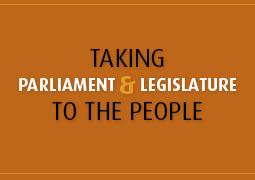
The National Council of Provinces (NCOP) is preparing to visit the Free State Province in August this year through its Taking Parliament to the People programme. As a first step towards that main visit, the NCOP will, from 15 to 19 May, embark on oversight visits to the Free State Province, with particular focus on the delivery of healthcare services in the Xhariep District Municipality.
The pre-visit and the main one in August will be conducted under the theme “Celebrating 20 years of the Constitution and 20 years since the establishment of the NCOP”.
Provision of quality healthcare is part of government’s apex priorities for service delivery and also one of the major targets of the National Development Plan (NDP) and the Sustainable Development Goals (SDGs), global agenda to end hunger, poverty and underdevelopment by the year 2030.
SDG 3 is a commitment by world countries to “ensure healthy lives and promote well-being for all at all ages”, and is targets include the reduction of global mortality ratio to less than 70 per 100 000 live births by the year 2030, end the deaths of new-borns and children under the age of five years and end the epidemics of Aids, TB, malaria and tropical diseases and combat hepatitis, water-borne diseases and other communicable diseases.
Other targets of SDG 3 are to strengthen the prevention and treatment of substance abuse, including narcotic drug abuse and harmful use of alcohol and substantially increase health financing and the recruitment, development, training and retention of the heath workforce in developing and under-developed countries.
During the week-long oversight activities in the Free State, the NCOP delegates will visit clinics and hospitals and meet with the MEC responsible for health in the Free State, the mayors, councillors and the Department of Health officials from national, provincial as well as local government.
Taking Parliament to the People is an annual programme of the NCOP conceptualised in accordance with Section 72 of the Constitution, which enjoins the NCOP to facilitate public participation in the legislative process and to conduct its parliamentary business in an open manner.
The Xhariep District Municipality, which is going to host the Taking Parliament to the People programme, is located in south-western Free State and named after the !Gariep Dam. The Xhariep District Municipality comprises of four local municipalities with 20 towns, namely:
- Kopanong, including the towns of Trompsburg, Edenburg, Bethulie, Phillipolis, Springfontein, Reddersburg, Jagersfontein and Fauresmith.
- Letsemeng, including the towns of Koffiefontein, Luckhoff, Jacobsdal, Oppermansgronde and Petrusburg.
- Mohokare, including the towns of Zastron, Rouxville and Smithfield.
- Naledi, including the towns of Dewetsdorp, Wepener and Vanstadensrus
The Xhariep District Municipality is the largest geographical area of in the Free State Province and boasts the largest dam in the country, the Gariep Dam. Moreover, three national roads (N1 – Gauteng to Cape Town, N6 – Eastern Cape to Bloemfontein and N8 – Bloemfontein to Kimberley) pass through the district, which is a big plus for the tourism industry.
Agriculture and mining are the main economic activities in the Xhariep District Municipality. The total GDP of Xhariep is approximately R1.9m and grows approximately at 3% on average per annum.
The leading industries in Xhariep are agriculture (15.1%), mining (14.9%), transport (13.5%) and government services (14.3%).
The leading industries contribute approximately 42.7% of the total GDP of the district. A high occurrence of mining is evident in Letsemeng (34.9%), indicating that the mining sector is a very prominent generator of income and economic activity.
Tourism in Xhariep is further enhanced by three nature reserves. It has high agricultural opportunities with strong livestock farming. It is a relatively crime-free area that creates a good environment for investment.
Agriculture in Xhariep varies from various types of crops to hardened livestock farming. Presently 7 429 farms (2 062 in Letsemeng, 3 059 in Kopanong, and 2 308 in Mohokare) are found over an area of 2.79 million hectares.
By Sakhile Mokoena
9 May 2017

